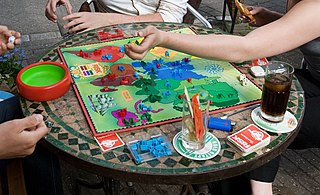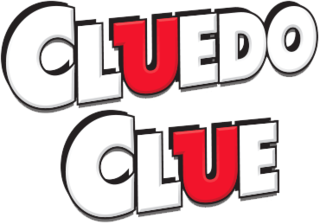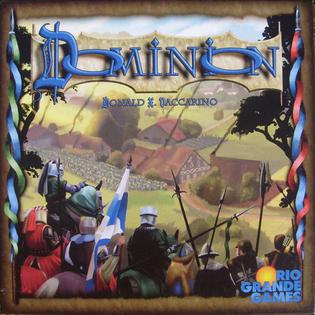
Monopoly is a multiplayer economics-themed board game. In the game, players roll two dice to move around the game board, buying and trading properties and developing them with houses and hotels. Players collect rent from their opponents and aim to drive them into bankruptcy. Money can also be gained or lost through Chance and Community Chest cards and tax squares. Players receive a salary every time they pass "Go" and can end up in jail, from which they cannot move until they have met one of three conditions. House rules, hundreds of different editions, many spin-offs, and related media exist. Monopoly has become a part of international popular culture, having been licensed locally in more than 103 countries and printed in more than 37 languages. As of 2015, it was estimated that the game had sold 275 million copies worldwide. The original game was based on locations in Atlantic City, New Jersey, United States.

Risk is a strategy board game of diplomacy, conflict and conquest for two to six players. The standard version is played on a board depicting a political map of the world, divided into 42 territories, which are grouped into six continents. Turns rotate among players who control armies of playing pieces with which they attempt to capture territories from other players, with results determined by dice rolls. Players may form and dissolve alliances during the course of the game. The goal of the game is to occupy every territory on the board and, in doing so, eliminate the other players. The game can be lengthy, requiring several hours to multiple days to finish. European versions are structured so that each player has a limited "secret mission" objective that shortens the game.

Cluedo, known as Clue in North America, is a murder mystery game for three to six players that was devised in 1943 by British board game designer Anthony E. Pratt. The game was first manufactured by Waddingtons in the United Kingdom in 1949. Since then, it has been relaunched and updated several times, and it is currently owned and published by the American game and toy company Hasbro.

Ticket to Ride is a railway-themed German-style board game designed by Alan R. Moon. It was illustrated by Julien Delval and Cyrille Daujean and published in 2004 by Days of Wonder. The game is also known as Zug um Zug (German), Les Aventuriers du Rail (French), Aventureros al Tren (Spanish), Wsiąść do pociągu (Polish), and Menolippu (Finnish).
A Game of Thrones is a strategy board game created by Christian T. Petersen and published by Fantasy Flight Games in 2003. The game is based on the A Song of Ice and Fire series of high fantasy novels by George R. R. Martin. It was followed in 2004 by the expansion A Clash of Kings, and in 2006 by the expansion A Storm of Swords.

Dune is a strategy board game set in Frank Herbert's Dune universe, published by Avalon Hill in 1979. The game was designed by Bill Eberle, Jack Kittredge and Peter Olotka. After many years out of print, the game was reissued by Gale Force Nine in 2019 in advance of the 2021 Dune film adaptation.

Gift Trap is a 2006 indie party board game, invented by Nick Kellet. Gift Trap is billed as "The hilarious gift-exchange party game". Gift Trap relies on the players' personal knowledge of each other, requiring the matching of the right gift to the right person.

Bosworth is a four-handed chess variant manufactured by Out of the Box Publishing company since 1998. It is played on 6x6 board and uses 4 sets of standard chess pieces.

Agricola is a Euro-style board game created by Uwe Rosenberg. It is a worker placement game with a focus on resource management. In Agricola, players are farmers who sow, plow the fields, collect wood, build stables, buy animals, expand their farms and feed their families. After 14 rounds players calculate their score based on the size and prosperity of the household.

Pandemic is a cooperative board game designed by Matt Leacock and first published by Z-Man Games in the United States in 2008. Pandemic is based on the premise that four diseases have broken out in the world, each threatening to wipe out a region. The game accommodates two to four players, each playing one of seven possible roles: dispatcher, medic, scientist, researcher, operations expert, contingency planner, or quarantine specialist. Through the combined effort of all the players, the goal is to discover all four cures before any of several game-losing conditions are reached.

Dominion is a card game created by Donald X. Vaccarino and published by Rio Grande Games. It was the first deck-building game, and inspired a genre of games building on its central mechanic. Each player begins with a small deck of cards, which they improve by purchasing cards from a common supply that varies from game to game. Cards can help the player's deck function, impede their opponents, or provide victory points. As of December 2022, fifteen expansions to the original Dominion have been released.

Small World is a board game designed by Philippe Keyaerts, Illustrated by Miguel Coimbra and Cyrille Daujean as graphic designer, and published by Days of Wonder in 2009. The game is a reworking of Keyaerts' 1999 game Vinci. Small World has won several awards, including Games magazine 2010 Game of the Year.

RoboRally is a board game for 2–8 players designed by Richard Garfield and published by Wizards of the Coast (WotC) in 1994. Various expansions and revisions have been published by both WotC and by Avalon Hill.

Dixit, is a French card game created by Jean-Louis Roubira, illustrated by Marie Cardouat, and published by Libellud. Using a deck of cards illustrated with dreamlike images, players select cards that match a title suggested by the designated storyteller player, and attempt to guess which card the storyteller selected. The game was introduced in 2008. Dixit won the 2010 Spiel des Jahres award.

Terra Mystica is a Euro-style board game for two to five players designed by Helge Ostertag and Jens Drögemüller. The game was first published by Feuerland Spiele in Germany in 2012, and was later published in English and French by Zman Games and Filosofia Édition in 2013. Feuerland Spiele released a second German edition of the game in 2013.
The Bottle Imp is a trick-taking card game designed by Günter Cornett and based on the Robert Louis Stevenson short story The Bottle Imp. It was first published in 1995 by Bambus Spieleverlag, and was re-released by Z-Man Games in 2010 under the name "Bottle Imp." It was re-published again by Stronghold Games in 2018.
Evolution: The Origin of Species is a card game created by Dmitriy Knorre and Sergey Machin in 2010. The game is inspired by the evolutionary biology. It was published by SIA Rightgames RBG. English, French and German game editions were published in 2011. Two or more players create their own animals, make them evolve and hunt in order to survive.
Evolution: Random Mutations is a card game created by Dmitriy Knorre and Sergey Machin in 2010. The game is inspired by the evolutionary biology. It was published by SIA Rightgames RBG. Publishing of the game was financed in Boomstarter. English, French and German game editions were published in 2014.

Evolution is a 2014 board game where 2-6 players build a highly competitive ecosystem of herbivores, carnivores and scavengers. Players adapt their existing species and evolve new ones in response both to the abundance or scarcity of food, but also the behaviour of other species in the ecosystem. The scoring system rewards players whose species have high populations, consume the most food and are the most diverse. It was designed by Dominic Crapuchettes of North Star Games, working with Dmitry Knorre and Sergei Machin, who had previously released a similar game in Russia.

Sagrada is a dice-drafting board game published by Floodgate Games in 2017.

















